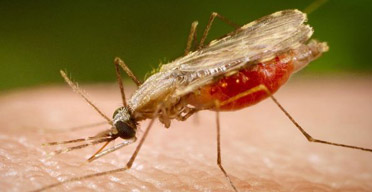
Summer is allegedly here and, while that should mean balmy evenings spent enjoying a chilled glass of wine or two in the garden, it also heralds the arrival of the niggling whine of mosquitoes.
Last year, high levels of rainfall during May, June and July followed by a hot spell left the country covered in puddles of stagnant water - perfect breeding grounds for mozzies - and it looks as though this year will bring more of the same.
The good news, at least, is that even with around 33 different species of mosquito in the UK - the most common variety is the Culex pipiens - malaria is not a risk here. However, around 2,000 travellers return to the UK each year having contracted it in countries where the disease is endemic, including Africa, central and South America and south-east Asia. Anti-malarial medication must be taken before, during and after travelling in risky parts of the globe.
Whether abroad or at home, though, avoiding getting bitten by mosquitoes and other pesky insects is a universally shared obsession. We know that many species of mosquito bite between dusk and dawn, so staying indoors during these hours can help. But what of the myriad other so-called solutions on offer?
Deet
According to the Department of Health, Deet (N-diethylmetatoluamide)-based products offer the best protection. In a trial conducted by the London School of Hygiene and Tropical Medicine (LSHTM), the best repellants for use outdoors were found to be those containing at least 30% Deet.
Although there have been concerns about its safety, experts from the National Travel Health Network and Centre claim "research and extensive clinical experience suggest that it is very safe when used according to the manufacturer's instructions". These include using a solution of no more than 20% Deet on infants and children and avoiding use altogether if babies are less than two months old.
Vitamin B1
The most widely available natural alternative is vitamin B1 (thiamin) which, it is claimed, provides up to 36 hours' worth of protection. Excess amounts of the vitamin are excreted by the body through sweat and urine and, in theory, mosquitoes are repelled by its smell (a scent undetectable to humans).
Certainly, the anecdotal evidence for taking B1 is huge and many are convinced that consuming increased amounts of Marmite or even beer (both containing vitamin B1) has saved them from being bitten. However, there is no scientific confirmation. Although several studies have been carried out, most were performed on animals, not people. In the most significant to date, conducted on humans by researchers at the University of Wisconsin and published in 2005, scientists found "no effect of vitamin B supplementation" in warding off mosquitoes.
Plant oils
Lemon eucalyptus contains citriodiol, an active ingredient often cited as nature's answer to chemical repellants. It is available as a spray, cream or plug-in diffuser, and some studies have provided evidence that it works.
There is also plenty of anecdotal evidence to back up the efficacy of peppermint oil. Eight years ago, a team from the Malaria Research Centre in Delhi suggested that the herb extract might also kill mosquito larvae before they hatch. However, huge doses would be needed to treat even a tiny area and experts doubt it will ever be made into a commercial repellant.
Citronella, a lemon-scented plant oil, is sold in lotions and candles for outdoor use. A study in the New England Journal of Medicine showed that, while not as effective as Deet, when applied to the skin it does provide 15 to 20 minutes' worth of protection. The same study showed no scientific evidence that citronella candles work.
Products containing thyme, lemongrass and other plant oils are unlikely to provide much protection. And some fragrances, such as lavender, may actually attract, rather than repel, insects and mosquitoes.
Patio heaters
According to Matt Shardlow, conservation director of the insect conservation trust Buglife, mosquitoes aren't so much attracted to body heat as to carbon dioxide. Patio heaters produce lots of carbon dioxide and so act like mosquito magnets.
Water containers
Get rid of or cover all garden water containers. Mosquitoes can breed in just 2.5cm of water. Change birdbath water weekly, keep ornamental pools stocked with fish and remove any surplus water from potted plants, poorly drained flowerbeds, holes in trees or clogged guttering.
Buzzers
Electronic buzzers are said to work by emitting high- or low-frequency sounds designed to replicate the wing beats of male mosquitoes, or dragonflies, which feed on the insects. Manufacturers claim the noise should frighten away female mosquitoes, the carriers of malaria. According to the LSHTM, this is "absolute rubbish". In 2005, a team from the school conducted a trial of 18 such devices for Holiday Which? and passed their findings to Trading Standards, warning that people who use them may be given a false sense of security.
Clothes
A mosquito finds you by a combination of body heat and the carbon dioxide you exhale. Wearing dark-coloured clothes makes you more likely to get bitten as black absorbs more heat than white. While mosquitoes are able to bite through many materials, canvas and denim make it more difficult.
Nets
When camping, insecticide-impregnated mosquito nets work well as a barrier to insects.
Body odour
In research published last year in the journal Current Biology, it was suggested that specific cells in the mosquito's nose are tuned to identify the different chemicals that make up human body-odour.
Differing proportions of carbon dioxide and the other compounds that make up sweat mean that some people simply smell sweeter to the insects than others. Your best bet is to stay clean and dry and don't disguise your unique scent.

